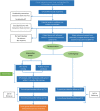Facilitating advance care planning in the general practice setting for patients with a chronic, life-limiting illness: protocol for a phase-III cluster-randomized controlled trial and process evaluation of the ACP-GP intervention
- PMID: 34172030
- PMCID: PMC8231078
- DOI: 10.1186/s12904-021-00796-1
Facilitating advance care planning in the general practice setting for patients with a chronic, life-limiting illness: protocol for a phase-III cluster-randomized controlled trial and process evaluation of the ACP-GP intervention
Abstract
Background: Advance care planning (ACP), a process of communication about patients' preferences for future medical care, should be initiated in a timely manner. Ideally situated for this initiation is the general practitioner (GP). The intervention to improve the initiation of ACP for patients with a chronic life-limiting illness in general practice (ACP-GP) includes an ACP workbook for patients, ACP communication training for GPs, planned ACP conversations, and documentation of ACP conversation outcomes in a structured template. We present the study protocol of a Phase-III randomized controlled trial (RCT) of ACP-GP that aims to evaluate its effects on outcomes at the GP, patient, and surrogate decision maker (SDM) levels; and to assess the implementation process of the intervention.
Methods: This RCT will take place in Flanders, Belgium. Thirty-six GPs, 108 patients with a chronic, life-limiting illness, and their (potential) SDM will be recruited, then cluster-randomized to the ACP-GP intervention or the control condition. The primary outcome for GPs is ACP self-efficacy; primary outcome for patients is level of ACP engagement. Secondary outcomes for GPs are ACP practices, knowledge and attitudes; and documentation of ACP discussion outcomes. Secondary outcomes for patients are quality of life; anxiety; depression; appointment of an SDM; completion of new ACP documents; thinking about ACP; and communication with the GP. The secondary outcome for the SDM is level of engagement with ACP. A process evaluation will assess the recruitment and implementation of the intervention using the RE-AIM framework.
Discussion: While the general practice setting holds promise for timely initiation of ACP, there is a lack of randomized trial studies evaluating the effectiveness of ACP interventions implemented in this setting. After this Phase-III RCT, we will be able to present valuable evidence of the effects of this ACP-GP intervention, with the potential for offering a well-tested and evaluated program to be implemented in general practice. The results of the process evaluation will provide insight into what contributes to or detracts from implementation success, as well as how the intervention can be adapted to specific contexts or needs.
Trial registration: Prospectively registered at with ISRCTN ( ISRCTN12995230 ); registered 19/06/2020.
Keywords: Advance care planning; Communication; Complex intervention; General practice; Phase III; Process evaluation; Randomized controlled trial.
Conflict of interest statement
The authors declare that they have no competing interests.
Similar articles
-
Experiences with implementing advance care planning (ACP-GP) in Belgian general practice in the context of a cluster RCT: a process evaluation using the RE-AIM framework.BMC Prim Care. 2024 Jul 6;25(1):247. doi: 10.1186/s12875-024-02510-5. BMC Prim Care. 2024. PMID: 38971761 Free PMC article. Clinical Trial.
-
General practitioner advance care planning knowledge and attitudes: ACP-GP cluster-randomised controlled trial.BMJ Support Palliat Care. 2024 Dec 19;14(e3):e2510-e2514. doi: 10.1136/spcare-2024-004977. BMJ Support Palliat Care. 2024. PMID: 38925875 Clinical Trial.
-
Complex advance care planning intervention in general practice (ACP-GP): a cluster-randomised controlled trial.Br J Gen Pract. 2024 Jan 25;74(739):e78-e87. doi: 10.3399/BJGP.2023.0022. Print 2024 Feb. Br J Gen Pract. 2024. PMID: 38253546 Free PMC article. Clinical Trial.
-
Advance Care Planning for People with Dementia: The Role of General Practitioners.Gerontology. 2020;66(1):40-46. doi: 10.1159/000500809. Epub 2019 Jun 18. Gerontology. 2020. PMID: 31212289 Review.
-
A systematic review of the effects of advance care planning facilitators training programs.BMC Health Serv Res. 2019 Jun 7;19(1):362. doi: 10.1186/s12913-019-4192-0. BMC Health Serv Res. 2019. PMID: 31174530 Free PMC article.
Cited by
-
Educational interventions for health professionals managing chronic obstructive pulmonary disease in primary care.Cochrane Database Syst Rev. 2022 May 6;5(5):CD012652. doi: 10.1002/14651858.CD012652.pub2. Cochrane Database Syst Rev. 2022. PMID: 35514131 Free PMC article.
-
Barriers and facilitators for healthcare professionals to the implementation of Multidisciplinary Timely Undertaken Advance Care Planning conversations at the outpatient clinic (the MUTUAL intervention): a sequential exploratory mixed-methods study.BMC Palliat Care. 2023 Mar 15;22(1):24. doi: 10.1186/s12904-023-01139-y. BMC Palliat Care. 2023. PMID: 36922796 Free PMC article.
-
Advance care planning engagement in patients with chronic, life-limiting illness: baseline findings from a cluster-randomised controlled trial in primary care.Br J Gen Pract. 2023 Apr 27;73(730):e384-e391. doi: 10.3399/BJGP.2022.0100. Print 2023 May. Br J Gen Pract. 2023. PMID: 37012079 Free PMC article. Clinical Trial.
-
Translation, Cultural Adaptation and Validation of the Advance Care Planning Engagement Survey for Korean Older People.Int J Older People Nurs. 2025 Jul;20(4):e70039. doi: 10.1111/opn.70039. Int J Older People Nurs. 2025. PMID: 40605586 Free PMC article.
-
Measuring advance care planning behavior in Dutch adults: translation, cultural adaptation and validation of the Advance Care Planning Engagement Survey.BMC Med Res Methodol. 2021 Sep 25;21(1):194. doi: 10.1186/s12874-021-01389-5. BMC Med Res Methodol. 2021. PMID: 34563115 Free PMC article.
References
-
- Rietjens JAC, Sudore RL, Connolly M, van Delden J, Drickamer MA, Droger M, van der Heide A, Heyland DK, Houttekier D, Janssen DJA, Orsi L, Payne S, Seymour J, Jox RJ, Korfage IJ, European Association for Palliative Care Definition and recommendations for advance care planning: an international consensus supported by the European Association for Palliative Care. Lancet Oncol. 2017;18(9):e543–e551. doi: 10.1016/S1470-2045(17)30582-X. - DOI - PubMed
Publication types
MeSH terms
Grants and funding
LinkOut - more resources
Full Text Sources


